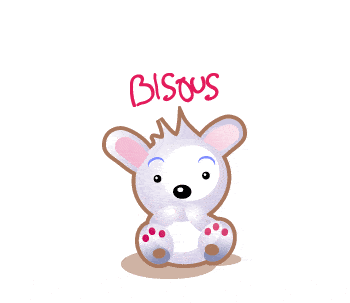A French kiss is a juicy, spicy subject, which is impossible to avoid when talking about French, and let me put your attention a bit aside of its romantic causes and to the fact that there are many-many words for a "kiss" in French! Not every kiss in France is a French kiss the way you understand it, which is good because be prepared to kiss a lot of people when you are in France since it is their common form of greetings and good-byes.
The simplest kiss to give is "une bise" (oon beez)—a kiss on the cheek, not romantic, and the one that is used to say "Hello!" or "Bye!" with friends, collegues, acquiantances of any gender. In the plural it is, similar to English "Kisses!", used as a good-bye: Bises!
The warmer and more playful kiss is called "bisou" (bee-zoo). This one is for lovers, too, so don't try it on people you don't know well. It is OK to say "Bizou" to your close friends or kids give a lot of "bisous" to their parents or grandparents, as it is a sign of affection and warm relationship. It might be a kiss on the cheek or on the lips and is also used in speech for a "good-bye".
The French kiss you're thinking about (with tongues) is called "une pelle" (pehl) or "un patin" (pah-teh), direct translations of which are "shovel" and "shoes" respectively. So when "rouler une pelle" (roo-lee oon pehl) is happening, the literal translation states "to wrap/roll a shovel" (not so romantic anymore, isn't it?).
There are also "un baiser" (beh-zee)—passionate kiss, something you would give to your lover, husband, wife, partner; "un bécot" (bee-koo) which is like a peck and "un smack" which has a brother in English and refers to a noisy kiss.

So, you're in France, on the way home and you see your neighbor from the next building is coming. Embrace yourself as you're going to "embrasser" (to kiss) this person to greet. And near your house on the bench there is a couple of teenagers who just can't unlock their lips to catch a break doing something that look like what the French would call "sucer la poire/pomme" (see-see liah pwahr/pohm)—"to suck a pear/apple", you may choose the fruit.
But naming kisses is not the only interesting thing in French. Counting in French is a bit of a task! You have it allright till 69, with tens having their names originated in numbers from 1 to 9, but then instead of "seventy" you say "sixty ten"—"soixante-dix" (swa-sont-dees)— and continue: 71 = "sixty eleven"—"soixante-et-onze" (swa-sont-ay-onz) and so on. Instead of a word for 80, isn't it more fun to call it "four twenty"? Well, the French think it is: "quatre-vingts" (kat-ra-van). Then for 90 it is no wonder they use "four twenty ten"—"quatre-vingt-dix" (kat-ra-van-dees).
Another interesting thing to learn about French is the way the French-speaking people respond to a sneeze. In any country it is a simple word or a sentence, but in French it is a whole ritual where every sneeze—first, second, third—gets its own special reponse and its own answer from the one who sneezed. So, the response to a first sneeze will usually be "À tes souhaits" (ah tay sweh), which literally means "To your wishes", (implying, of course, "May your wishes come true.") A second sneeze is responded to by "À tes amours" (ah tayz ah-moor)—"To your loves", and a third "À tes enfants" (a tay ahn-fahn)—"To your children". To the first two of these the sneezer may respond, "Et que les tiennes se réalisent," (ay kuh lay tee-en seh reh-ah-lee-zeh)—"May yours come true" and "Et que les tiennes durent toujours," (ay kuh lay tee-en diu-oor too-jhoor)—"May yours last forever" respectively.
Here I am saying "Bisous!" to my French part of Langventure. Insofar, it was the hardest, but I learned that French language is anything but boring! See you on the next German "trip"!

Á la prochaine! (Ah lia proh-shah) See you later! Bisous!